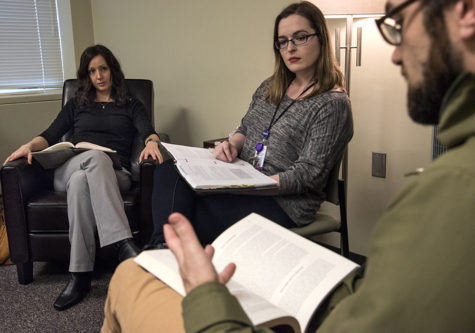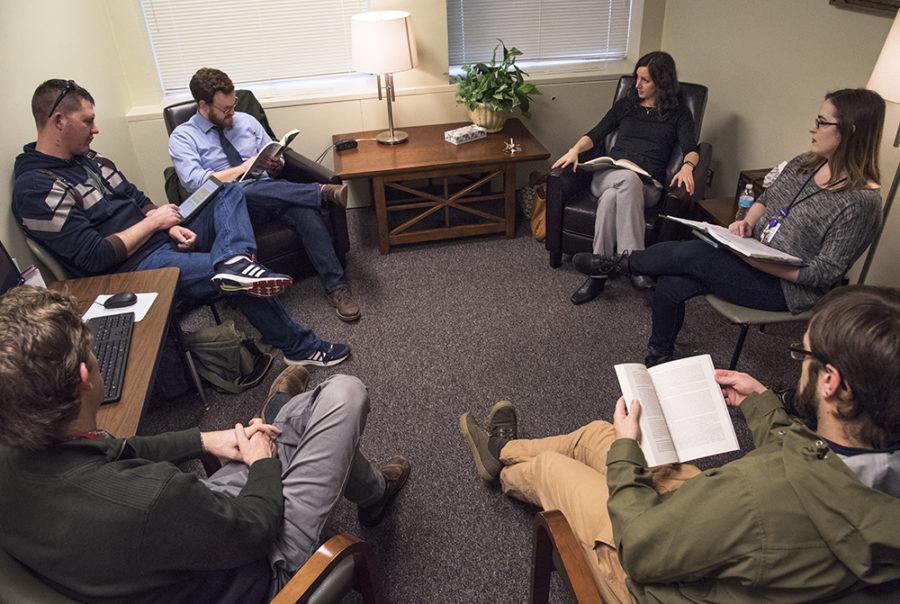Clinical Center director says loss of state funding ‘would be the end of us’
Clinical psychology doctoral candidates discuss progress monitoring from their assigned reading in “The Case Formulation Approach to Cognitive-Behavior Therapy” by Jacqueline B. Persons on Monday, March 6, 2017, under the advisement of Assistant Professor of Clinical Psychology Sarah Kertz in SIU’s Clinical Center. The Clinical Center could be at risk of losing $365,577 if the university receives no state appropriations by June 30. (Morgan Timms | @Morgan_Timms)
March 8, 2017
When Sunni Primeaux was growing up, she watched her older brother struggle with schizophrenia. Unable to hold a job due to his symptoms, he was homeless for several months before being accepted into a group home five years ago.
Though seeing him try to cope with the disorder in his day-to-day life was difficult, Primeaux was particularly affected by his trouble finding mental health care.
“They would turn him down because they were full or his symptoms weren’t bad enough,” said Primeaux, a doctoral student studying clinical psychology. “It made me want to be part of this, so I could help someone like him.”
Advertisement
Primeaux scanned a list of college majors when she was a high school senior. Only one stuck out to her: psychology. She is currently one of about 60 graduate students receiving training at SIU’s Clinical Center.
This community and student resource may now be at risk. The Clinical Center is one of 15 centers or initiatives SIU’s non-academic prioritization committee, which was appointed by interim Chancellor Brad Colwell, suggested could become self-supporting with the goal of eliminating state funding by 2022. This is expected to save the university $5.5 million in five years.
The Daily Egyptian is publishing a series of stories to examine the effect those proposed cuts would have on the university community. This is the seventh in the series.
Since July 2015, Republican Gov. Bruce Rauner and Democrats who control the state Legislature, including House Speaker Michael Madigan, have failed to come to an agreement on a state spending plan. In light of the state’s historic budget impasse, public universities are considering ways to continue operations with the assumption some funding could be cut permanently.
Two stopgap measures passed through the Legislature in 2016 totaled $83 million in financial support for the SIU system. Those funds, for the most part, were used to pay the bills from the 2016 fiscal year. The university started the 2017 fiscal year “basically back at zero” and is dipping into the reserves once again, SIU President Randy Dunn has said.
These cuts would not be the first implemented in recent years. The 15 institutions or centers suffered a permanent 10 percent reduction in state funding in fiscal year 2016, according to the committee’s report. Others saw additional cuts in fiscal year 2017.

Clinical psychology doctoral candidates Ryan Kimball, of Highland, Utah, right, and Christine Breazeale, of Vicksburg, Mississippi, middle, discuss an assigned reading on progress monitoring with Assistant Professor of Clinical Psychology Sarah Kertz on Monday, March 6, 2017, in SIU’s Clinical Center. (Morgan Timms | @Morgan_Timms)
On Feb. 23, the university released another report that prioritized the initially recommended cuts by the committee. The 15 centers or initiatives that may be slated for dramatic cuts to state funding are still at risk, which could mean a loss of $365,577 for the Clinical Center, according to the first report.
Advertisement*
Graduate students in clinical psychology, counselor education and communications disorder rehabilitation are able to provide treatment, assessments and therapy to any community member or student for things like learning disabilities and speech-language and psychological disorders. Last year, the clinic had 5,369 direct client service hours, said Holly Cormier, the center’s director.
Cormier said if that money was gone, the Clinical Center would go with it.
“If we lose state funding, that would be the end of us,” Cormier said. “There’s not much we would be able to do.”
Costs per session for clients — which are currently between $5 and $30 for individual therapy and between $2.50 and $15 for group therapy — would likely have to be raised in the event of a budget cut, Cormier said. This would mean many clients would be unable to afford sessions, and graduate students would have fewer clients available for their training.
Since most of the amount listed in the report goes toward faculty and staff salaries, Cormier said she would have to start terminating staff lines if state funding is cut.
Every graduate student who trains at the center is overseen by a licensed staff member, Cormier said, which means if staff members were fired, there would be no one to supervise student therapists.
“It’s interesting we’re in this report about non-instructional programs,” she said. “We’re the arms and legs of several different academic programs. If the clinic goes away, these programs are in peril.”
Graduate students in these programs also have to complete an internship in order to graduate. Students without direct client service hours are not likely to get one, Cormier said.
If the Clinical Center closed, she said students would have to look to private practices to get that experience, where they would be unable to receive the same level of training.
“Those places’ missions are service, not training,” Cormier said. “Students don’t get that corrective feedback they need, because that’s time, that’s energy, those are billable hours.”
Cormier said the center’s closure would also affect the American Psychological Association’s accreditation of the graduate programs that use it.
She said these standards ensure uniform requirements for psychologists-in-training. Without the Clinical Center, students have no resources to get that uniform training.
Christine Breazeale, a doctoral student studying clinical psychology, said she wouldn’t have chosen SIU for graduate school if her program didn’t have APA accreditation or if the Clinical Center wasn’t there.
“It just wouldn’t make us marketable,”Breazeale said. “We wouldn’t be able to get licensed in the long run. In the short run, we would some of the most incompetent therapists around.”
Brezeale said without a Clinical Center, graduate enrollment in the psychology program would probably decline, leaving fewer classes offered for the undergraduate psychology program because there would be fewer teaching assistants to teach them.
In the fall of 2016, there were 406 undergraduates enrolled in the psychology program. Since 2012, psychology and criminal justice have traded off as the top major of choice for undergraduate students, according to university data.
“Psychology is always in the top two highest-enrolled undergraduate programs in liberal arts,” Brezeale said. “Can you imagine the impact this would have on undergrads?”
Primeaux agreed, and said the community would be just as affected by the center’s closure.
“This is a rural, less wealthy area, and there aren’t a lot of providers out there,” Primeaux said. “And if there are, they’re really expensive. The people we see here just can’t afford them.”
Cormier said those with the lowest incomes are typically the most in need of the counseling and treatment provided by the center.
“This is always the story: The most vulnerable populations get hit the hardest in times of financial crisis,” Cormier said. “We’re affordable and accessible. We’ve even had people who are homeless coming here.”
Diane Muzio, the center’s coordinator for speech-language services, said the center has long been a recruitment tool for SIU, and its closure would contribute to the university’s already declining enrollment.
“I’ve seen a number of other clinical centers around the Midwest,” Muzio said. “Ours is spacious, it’s comfortable, we have state-of-the-art resources — not every place has that, and students see that when they’re making their choice for graduate schools.”
Muzio said the center’s classification as “non-academic” in the report is a mistake.
“The fiscal reality is that SIU does have to do something different,” Muzio said. “But these changes need to be made with accurate information and careful consideration, because if mistakes like this are made, that’s going to be more costly.”
Primeaux said the most rewarding part of her work at the Clinical Center is seeing a patient’s quality of life improve radically after undergoing treatment.
“I don’t know what we would do without the Clinical Center,” Primeaux said. “You just don’t learn how to do therapy from a book.”
Staff writer Marnie Leonard can be reached at [email protected] or on Twitter @marsuzleo.
To stay up to date with all your southern Illinois news, follow the Daily Egyptian on Facebook and Twitter.
Advertisement








Sara Davison • Mar 12, 2017 at 12:11 am
Close these so call center. I’ve been a nurse in the area for 10 years and never heard of them. There are a lot of so called services in the area that are just collecting grant money and not seeing clients.